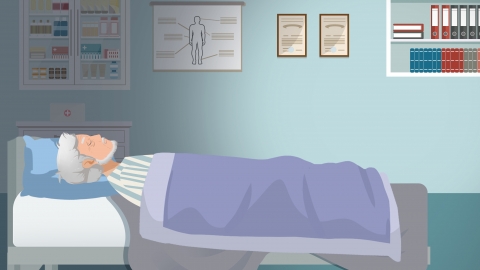What Are the Causes of Insomnia in Elderly Stroke Patients at Night?
Sleeplessness in elderly stroke patients at night may be caused by circadian rhythm disorders, physical discomfort, poor sleep environment, depression, hypertension, and other factors. Management should be based on the specific situation. It is recommended to visit a hospital promptly and follow medical advice for treatment.

1. Circadian Rhythm Disorders: After a stroke, the lifestyle of elderly patients may become disrupted, with reduced daytime activity and increased daytime sleep, leading to nighttime circadian rhythm disturbances and difficulty falling asleep. Family members should assist the elderly in re-establishing regular sleep patterns, engage them in simple daytime activities such as indoor walking, and reduce daytime napping.
2. Physical Discomfort: Strokes may cause limb pain, numbness, and other discomforts, which are more noticeable at night when the environment is quiet, thereby disrupting sleep. Discomfort can be alleviated through massage and warm compresses on the affected areas, as well as adjusting to a comfortable body position. If symptoms are severe, promptly inform the doctor to assess whether further intervention is needed.
3. Poor Sleep Environment: An excessively noisy sleep environment, overly bright lighting, or unsuitable temperature can affect sleep quality, causing difficulty falling asleep and frequent awakenings. It is recommended to improve the sleep environment by keeping the bedroom quiet, dark, and comfortable, and avoiding the use of electronic devices.
4. Depression: Physical functional limitations after a stroke and increased psychological stress can lead to anxiety and depressive moods, resulting in insomnia, often accompanied by low mood and loss of interest. It is recommended to use medications such as escitalopram oxalate tablets, sertraline hydrochloride tablets, and agomelatine tablets under medical guidance to regulate mood. Family members should also provide companionship and psychological support.
5. Hypertension: Long-term high pressure on blood vessel walls may impair cerebral blood circulation, leading to insomnia, with symptoms including headache and dizziness. Patients may use medications such as nifedipine controlled-release tablets, valsartan capsules, and hydrochlorothiazide tablets under medical guidance to stabilize blood pressure. Regular blood pressure monitoring and maintaining emotional stability are also necessary in daily life.
During treatment, individualized treatment plans should be developed based on the specific conditions of the elderly patient to improve their sleep quality and quality of life.
References:
[1] Wei Cheng. Rehabilitation Training and Efficacy Analysis for Elderly Patients with Stroke Hemiplegia [J]. Cardiovascular Diseases Electronic Journal of Integrated Chinese and Western Medicine, 2019, 7(21): 51+53.
[2] Wang Ting. Effect of Rehabilitation Nursing Combined with Acupuncture on the Recovery of Elderly Patients with Post-Stroke Sequelae [J]. Practical Clinical Nursing Journal, 2018, 3(02): 53+55.




